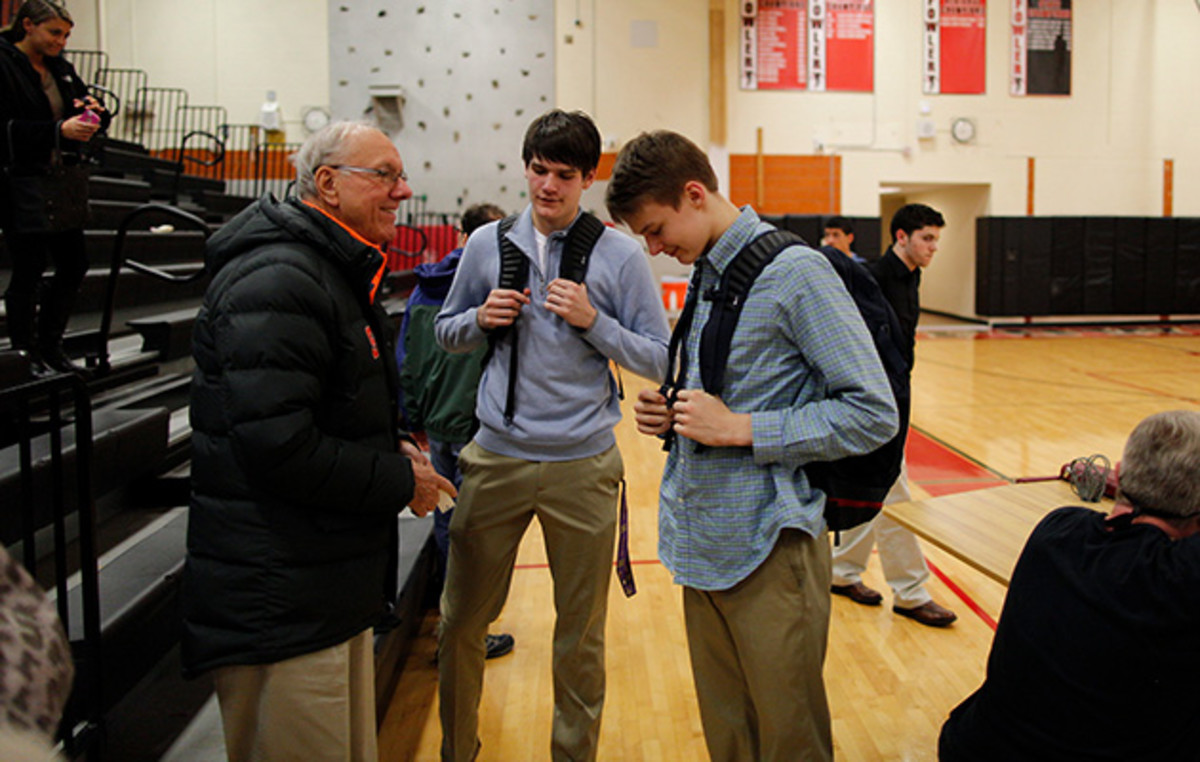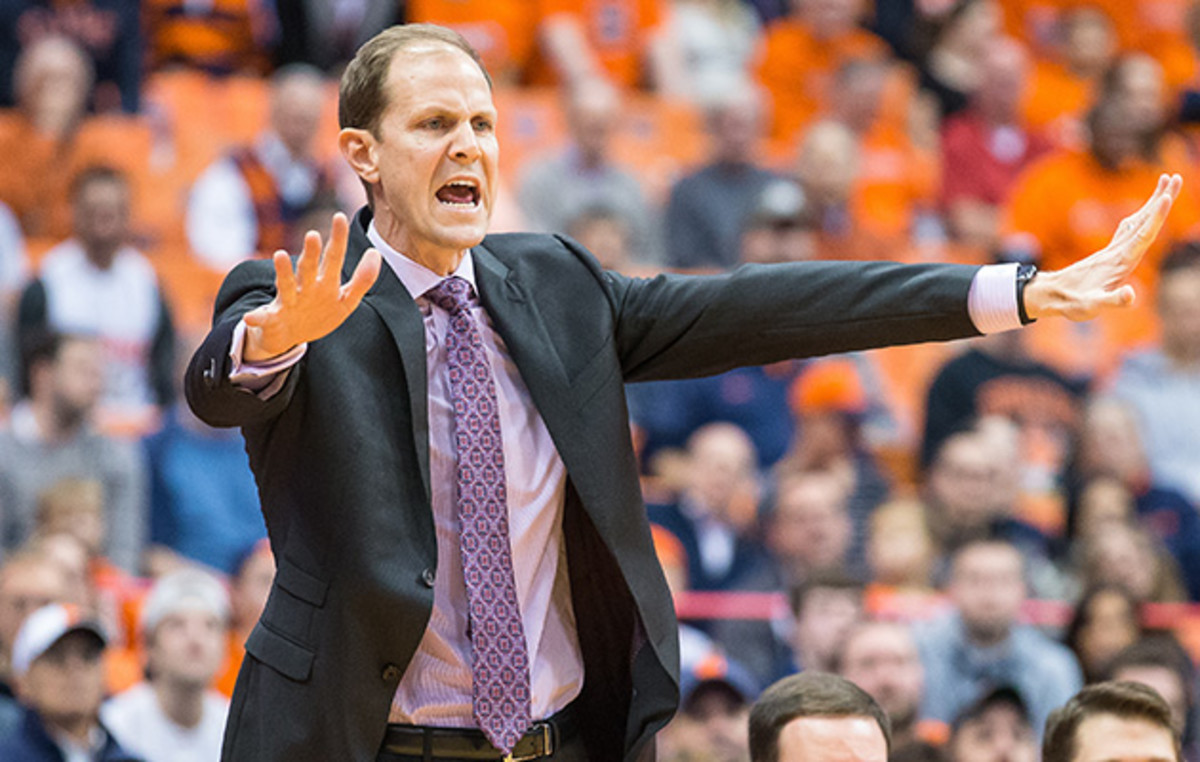Cooking shows & crime novels: How Jim Boeheim spent his suspension

This article originally appeared in the Jan. 11, 2016, issue of Sports Illustrated. Subscribe to the magazine here.
The king has been gone, but all the while his throne has remained tantalizingly available.
“I’m going in,” said Syracuse assistant coach Gerry McNamara one afternoon not long ago. McNamara was standing in the tiny, windowless and, needless to say, nonbathroomed office of Kip Wellman, the Orange’s director of basketball operations. “I gotta try it.”
“I wouldn’t do it,” said Wellman, feigning terror. “He’ll find out. Somehow. Some way.”
“It’s a chance I gotta take,” said McNamara, nodding and setting his jaw as if he were about to take a hill.
He didn’t, of course. McNamara turned right instead of left and headed out of the basketball office and down the hall to the public men’s room. That is Standard Bathroom Procedure for all of Syracuse’s basketball personnel save one.
And now that one is coming back.
Sometime around 9 a.m. on Jan. 6, Jim Boeheim was expected to walk into his office at the Carmelo K. Anthony Center, Melo as it’s known to most around Syracuse. One of the first things he would see is a 900 jersey hanging on the wall that commemorates a victory milestone he achieved early in the 2012–13 season. But Boeheim, the head man at ’Cuse since 1976, is no longer an official member of the 900 Club. As a result of a heavy penalty dropped on the Syracuse program for a variety of infractions—ones that the coach did not commit but were deemed to have occurred because of his lack of oversight—the NCAA subtracted 101 wins from Boeheim’s career record, leaving his rejiggered mark at 871–334. Along with the vacated wins, Syracuse also lost eight scholarships over four years and will be on probation until 2020.
But there was a harsher penalty as far as Boeheim was concerned. By NCAA edict he was ordered to separate himself from his team utterly and completely for nine games and all the time in between those games. He went into exile on Dec. 4, meaning that upon his return, three days before a Jan. 9 date with North Carolina in the Carrier Dome, he will not have spoken, texted, emailed, carrier-pigeoned or mind-melded with his staff or players for 32 days.
“There could be no greater punishment for a coach, certainly for this coach,” says Jim’s wife, Juli, “than taking his team away from him.”
• MORE:Why Bob Knight still won't return to Indiana
The sanctions against Boeheim and the program were based upon an eight-year investigation that found the following: Syracuse’s former director of basketball operations had completed course work for a player, players who had failed drug tests were not held out of practice sessions per school policy, and a booster had paid a total of about $8,000 to five Syracuse athletes (two of whom were basketball players) for what was supposed to be volunteer work at a YMCA.
The NCAA ruled that Boeheim was not aware of either the academic fraud or the booster payments but was still “presumed to be responsible for the actions of all institutional staff members who report, directly or indirectly, to the head coach,” a phrase written in to the NCAA’s bylaws a little more than three years ago.
Originally Boeheim went on the offensive, calling the sanctions “severe” and appealing both his vacated wins and the suspension. The coach won only a small victory—he had been ordered to miss nine conference games, and the NCAA changed it to just nine games. That’s why his suspension started with the non-conference Georgetown game on Dec. 5.
During the exile, Boeheim tempered his anger. “What I don’t want to do is keep griping and moaning,” he said near the start of his suspension. “I said all I have to say.”
“He really hasn’t talked about the penalties,” said Juli. “I would describe this time as more like . . . quiet misery.”
Boeheim concurs with that description. Over the last month he has watched countless episodes of Barefoot Contessa and Diners, Drive-Ins and Dives, perused magazines “just like all the other old men” at his local Barnes and Noble, torn through a passel of crime novels (Michael Connelly’s work is a favorite) and, in general, driven himself and those around him a little bit crazy.

Highlights during his exile? “Can’t think of any,” he says. He did get to watch his three kids (Jimmy and Jack, called Buddy, and daughter Jamie, called Sissy) play several games for their high school teams (senior Jimmy went for 39 and 31 points as Boeheim looked on), but parental spectating fosters its own brand of agony.
“I just thought of something,” says Boeheim, snapping his fingers. “I really liked Creed.”
(“Stallone has never been better!”—Jim Boeheim, Syracuse Bugler.)
Even with many extra hours around his suburban Syracuse home, Boeheim, 71, found himself unable to change his domestic routine, which has never been out of the New Age Man playbook.
Home repair projects? “I don’t have any skills in that area.”
Cooking? “I only watch other people cook.”
Take out the garbage? “I’d screw it up, and Juli would only correct me.”
“After one week,” Boeheim says, “it felt like 10. After four weeks it felt like a year.”

*****
NCAA slapdowns are nothing new to big-time sports programs, of course, but sending the coach to a metaphorical Siberia during the season is unusual. (A Southwest version of the same misery came to an end several weeks ago when Larry Brown, similarly exiled by the NCAA, returned to the bench at SMU after nine games away.) Consequently there were gray areas, and a kind of dot-every-i-cross-every‑t paranoia overtook Orange Land as everyone tried to get all the questions answered by the NCAA.
For example:
• Boeheim wanted to know if he could go into Melo after hours to work out and collect his mail. Answer: No. And his mail should be delivered not by his assistant Kelly Seubert (too close a connection) but by Kelly Taylor, who administers the Jim and Juli Boeheim Foundation. Should Taylor encounter the coach at the mailbox, she could chat only about foundation matters, but usually, Taylor said, “I just did a drive-by drop-off. Didn’t want to take any chances.”
• Boeheim wanted to know if his kids could continue to work out at Melo. Answer: No. Revised to yes.
• Seubert wanted to know if she could communicate with Juli if necessary. Answer: Yes, but no basketball-related questions. The Syracuse compliance office insisted that questions be sent by email so there would be a written record.
• What if a serious problem arose with a player, and Boeheim had to be informed? Answer: Call Boeheim’s lawyer and let him talk to the coach. (It was later agreed that the coach could talk to AD Mark Coyle.)
• What if you accidentally ran into Boeheim at, say, the fresh fruit section at Wegmans? “Well, first, you’d never see Jim in the fresh fruit section,” said Syracuse sports information director Pete Moore, “but you’d have to report it.” Indeed, anyone encountering Boeheim in an away-from-campus setting was allowed to exchange pleasantries but had to move on quickly and register the encounter with the Syracuse compliance office. (According to Boeheim, there were no surprise encounters.)
ACC reset: Virginia is conference’s top contender again, but in surprising way
A more personal situation came up with Syracuse’s longtime video coordinator, Todd Blumen. He is extremely close to the Boeheims—he frequently babysat their kids when they were younger—and Blumen sought permission to spend Christmas Eve at the Boeheim home. “I’m part of the family at that point,” Blumen says. Blumen was an emotional wreck until he got this emailed answer from Mark T. Wheeler, Syracuse’s director of compliance, about two weeks before Christmas: “I received word from the NCAA that you are ok to have your traditional Christmas dinner at the Boeheims’.”
Blumen came, helped cook and wrap presents, and departed at 2 a.m. “Basketball didn’t even come up,” said Boeheim. “We didn’t want to touch the subject.”
The question of Boeheim’s weekly radio show sent the absurdity thermometer rising. The NCAA did not stand in Boeheim’s way of continuing the show. Ah, but could the assistant coaches listen? Would that constitute “basketball-related contact” with the boss? Astonishingly, this became A Thing.
Wheeler’s answer: You can’t listen to it. NCAA clarification: We can’t stop you, but if you didn’t listen before the sanctions, we’d prefer you not listen now.
“I didn’t want to take a chance,” said Mike Hopkins, Boeheim’s top assistant and the man in charge over the last month, “so I never tuned in.”

*****
Hopkins, a former Orange player and a 20-year assistant under Boeheim, is also Syracuse’s coach-in-waiting, scheduled to take over the program when Boeheim retires after the 2017–18 season. So while he chair-warmed for Boeheim, upon returning Boeheim will in a way be chair-warming for Hopkins. It’s all extremely confusing and extremely hard on Hopkins, an emotional man who wept when Boeheim walked out the door on Dec. 4. And as temperamental opposites, Hopkins and Boeheim couldn’t be more different in the way they conduct their team business.
For example, Boeheim strides into a film study, gives the signal to start the video and begins talking in his flat monotone. The session ends when he stops talking. That’s it. Hop is all over the place, asking questions, seeking information, stopping and starting. Same for game day. Boeheim walks into the locker room, acknowledges no one, hands his coat to a manager, grabs a Pepsi and adjourns to a back room, never to be seen until he picks up the chalk for the pregame notes. Hop, by contrast, is a bundle of nerves, visiting and revisiting stratagems and ideas, issuing mini pep talks, a force of nature all over the place. “Jim’s been doing this so long, he doesn’t listen to anybody,” says SID Moore, “while Hop is like Robin Williams. He’s got eight voices in his head.”
The players have said all the predictable things about this coaching interregnum. “Boeheim and Hop are pretty similar,” center DaJuan Coleman told Syracuse’s Post-Standard. “They make pretty much the same calls.” But for a month they heard a voice and reacted to a leadership style vastly different from Boeheim’s.
That might sound small, but a certain rhythm was established, which will be broken by Boeheim’s comeback. Plus, this Syracuse team, 10–5 as of Sunday, is vulnerable—not particularly deep, plagued by spotty perimeter shooting, weak rebounding and defensive lapses in its usually reliable 2–3 zone. “Some might look at the basketball part as awkward,” says Hopkins, “but we’re here to follow a script, and that is Coach Boeheim’s script.”
• MORE: Hoop Thoughts: Why should buy Syracuse stock right now
The script has been followed, with mixed results, and who’s to say it would have been any different with Boeheim at the helm? Where he has been for the last nine games is sitting on a couch in his living room, about three feet from a giant TV screen, his beloved Shih Tzu, Lulu, curled up near him, kids and their friends sprawled on couches behind him. For Juli, watching her husband watch games now is much better than it was early in the 2001–02 season when he was home recovering from prostate cancer surgery. “He was a madman,” says Juli. “Let’s leave it at that.” Boeheim returned after three games—the original schedule called for six—and coached for weeks with a catheter.
Given his status as an exile, Boeheim did not want to make public everything he said from afar during games over the last month. In any case he refrained from criticizing Hopkins, who is, after all, his hand-picked successor. But suffice it to say that he was engaged. At one point Lulu jumped when the coach slammed his arm on the couch, and Lulu is severely orthopedically challenged.
One pearl is too delicious to leave out. “I wish I was there,” Boeheim said exasperatedly of one player on his TV, “just so I could’ve taken him out of the game.”
Well, now he will be there, and the decisions will all be his. “Mike has done a fine job,” Boeheim said as he geared up for his return, “but it’s my team again.”
To that end, everything will be in order when he returns. Seubert nervously revealed that a staff meeting has already been set. (She has refused to be quoted for fear that the NCAA is watching.) On Boeheim’s desk will be several of the large legal-sized yellow tablets he likes to write on, and in his minifridge will be a stockpile of chilling Pepsis.
As for whether his office bathroom will be in the pristine condition it was when he left ... well, that’s anyone’s guess.
